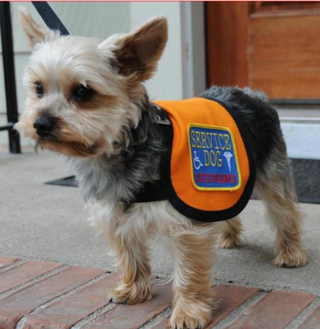Animal Behavior
Service Animal Scams: A Growing Problem
A cottage industry has developed around fake emotional support animals.
Posted June 11, 2014 Reviewed by Jessica Schrader

While bicycling around the lovely public squares of Savannah a couple of years ago, I spotted a family with three young kids and a handsome German shepherd wearing a bright red "service dog" vest. I enjoy talking with people about their companion animals, so I stopped, complimented them on their dog, and naively asked the dad, “I see she’s a service dog. What service does she provide?” He suddenly got the deer-in-the-headlights look, hemmed and hawed a bit, and finally said, “Errrr … she’s not really an official service dog. She just helps keep the kids together when we go for walks.” It turns out that he had purchased the nifty service dog vest from Amazon.
When I got back to my hotel, I started searching the internet for service dog paraphernalia. I was shocked. With absolutely no proof of an animal’s training or abilities, Amazon will sell you vests, leashes, collars, and dog tags indicating that your dog is a “service dog,” an “emotional support dog,” or a “seizure alert dog.” For a few bucks more, you can purchase an ominous legal-looking card saying you are prepared to sue the skeptical restaurant owner who thinks their no-pets allowed policy applies to your puppy.
I also discovered a host of dubious service and emotional support animal "registries." For example, the United States Dog Registry will certify any dog as a “service dog” or a "therapy dog" for $58, and an outfit called ESA of America will happily certify your pet rat, hamster, or iguana as an “emotional support animal.” (Sample ESA customer testimonial–“I have now taken three flights with my dog, and the peace of mind of being able to just pack up and go anywhere I want with him is the greatest thing ever.")
Then I began to ask around about bogus assistance animals and immediately began to hear stories. A high profile animal activist confessed to me that several of his friends had purchased phony service vests so they could take their pets into restaurants (he refuses to go out to eat with those friends anymore). And my daughter told me about a woman she knows who got a free flight for her dog to Southeast Asia by having a social worker pal write a letter saying the pet provided her with emotional support (while the ruse worked, the dog did have to wear a canine diaper on the trip).
A Legal Morass
Plenty of people with medical and psychological disabilities have legitimate needs for service dogs, therapy dogs, or emotional support animals. And having your service dog wear a vest can make things a lot easier when it comes to getting assistance animals into places where pets are not allowed. But the present system governing the status of service animals is rife with abuse.
Three different sets of federal statues apply to the rights of individuals with disabilities to be accompanied by animals: the Americans with Disabilities Act, the Fair Housing Act, and the Air Carrier Access Act. This division of responsibility has resulted in a bewildering array of conflicting and confusing regulations. Take, for example, the laws pertaining to animals in public places such as restaurants, stores, and shopping malls and the laws governing the right to take assistance animals on airplanes.
Dogs in Public Places: The Americans with Disabilities Act
The ADA governs the accessibility of public places and commercial enterprises. The rules (here) are administered by the Civil Rights Division of the Department of Justice, and they only pertain to “service animals.” The guidelines are strict–in theory. First, under ADA regulations, only dogs can qualify as service animals (in a few special cases, miniature horses can also qualify). Second, pets are not considered service animals. Third, and most important, service dogs must be specially trained to perform specific services for specific disabilities. Legitimate service dogs range from guide dogs for the blind to psychiatric service animals which can sense oncoming panic attacks in owners suffering from post-traumatic stress disorder.
The ADA regulations seem reasonable, but the devil is in the details. One problem is that the law stipulates a person claiming to have a service dog can only be asked two questions by, for example, the owner of a no-pets restaurant. The first is, “Does the dog provide a service?” The second is “What has the dog been trained to do?” This means that a person with a service dog cannot be asked what their disability is (I inadvertently violated the law when I asked the family in Savanah about their “service” dog). Nor can they be asked to provide any documentation attesting that their dog has been trained and certified as a service animal. Indeed, there is no federally recognized service animal certification program. Further, contrary to conventional wisdom, service animals do not need to have any kind of identification such as a vest.
Free Plane Rides: The Air Carrier Access Act
My daughter’s friend who snagged a free trip to Asia for her dog did so under the auspices of a different federal agency–the Department of Transportation. The DOT regulations (here) differ from the Americans with Disabilities Act in several important respects. First, unlike the ADA, the Air Carrier Access Act gives legal standing to animals whose sole function is to provide emotional support. This means that, unlike service dogs, emotional support animals are not required to be trained to perform specific tasks. It’s enough that they are necessary for your psychological wellbeing. Thus your lovable pet puppy may well be entitled to free air travel if she helps you get through your day.
But don’t get too excited just yet. In some ways, the rules for emotional support animals are more rigorous than for service dogs. That’s because the feds have given airlines considerable flexibility in what is required of passengers who claim they need to be in the company of their emotional support animal.
Take Delta Airlines (here). If you claim to need four-legged emotional support to stave off a panic attack on your next flight, you will need to provide the airline with a signed letter from a “licensed mental health professional” (your family doctor will not do the trick). The letter must include the professional’s address and phone number, and it must state that you have a disorder listed in the fourth edition of the Diagnostic and Statistical Manual of the American Psychiatric Association. Further, you have to be under active treatment for your disorder by this “mental health professional.” The good news is that this letter, however, will allow your pet to accompany you in the cabin of the plane for free for a year.
The AACA differs from the ADA in another respect as well. Emotional support animals are not restricted to dogs. So if it is OK with the airline, you can bring your iguana along on the ride to calm your jangled nerves. I would advise, however, against becoming psychologically dependent on a Great Dane; emotional support animals flying on Delta are required to fit under their owner’s seat.
The Cesspool of Human-Animal Relationships?
One person who is concerned about the proliferation of bogus service animal registries is Steve Zawistowski, senior science advisor of the ASPCA. When I asked him about the cottage industry that has arisen around fake assistance animal paraphernalia and phony service dog certifications, he replied: “It’s the cesspool of human animal relationships that no one wants to talk about.” And when I asked a Department of Justice agent about the proliferation of Internet service dog registrations agencies, she said simply, “They are frauds.”
There are legitimate service dog training programs that have rigorous standards. But for a list of some service and emotional support animal registries that have few if any standards and that have been accused of being bogus see here.
For a personal account of the unfortunate consequences bogus service animal industry see here.
Finally, if you need an official-looking letter to the airlines from a “mental health professional” indicating that your dog, cat, iguana or goldfish qualifies as an “emotional support animal,” try these guys. For $168, they will diagnose your psychological problems over the internet. And they have master’s degrees!
Bon voyage!
Hal Herzog is Professor of Psychology at Western Carolina University and author of the book Some We Love, Some We Hate. Some We Eat: Why It’s So Hard To Think Straight About Animals.




